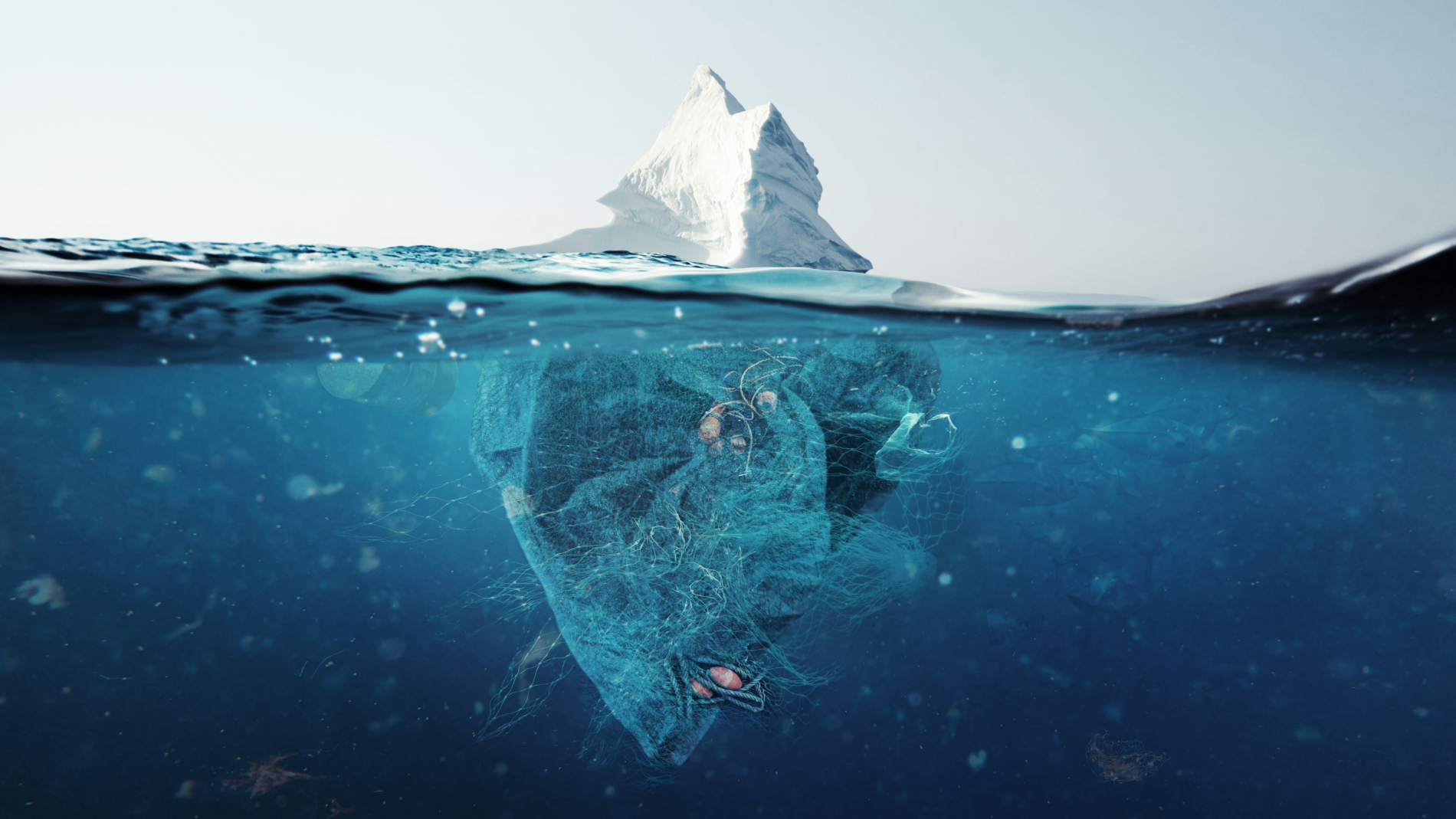The Centre for the Ocean and the Arctic is the project leader of GOMPLAR (Governance of Marine Plastic Litter in the Arctic), which is funded by the Polar Program at the Research Council of Norway.
Read more here.
Negotiations towards an International Legally Binding Instrument to end Plastic Pollution, 2024 and 2023
Four out of the five planned negotiations by INC the Intergovernmental Negotiating Committee have been carried out:
INC-1) Punta del Este, Uruguay 28 November-2 December 2022
INC-2) Paris, France 29 May-2 June 2023
INC-3) Nairobi, Kenya 13-18 November 2023
INC-4) Ottawa, Canada 23-29 April 2024
INC-5) Scheduled to be the last session of negotiations, 25 November–1 December 2024, Busan, Republic of Korea.
GOMPLAR researchers at SINTEF Ocean are observers at each session of negotiations. As the negotiations are slowly coming to an end, they are able to track all statements, views, and interventions from UN member states and NGOs during the negotiations.
A big thank you to Emily Cowan and Rachel Tiller for the daily recaps from the negotiations, which they publish on their LinkedIn-profiles. This is a huge accomplishment after the long hours (at times, 15+ a day). The recaps are such useful reads for the rest of us, one can feel the atmosphere in the negotiation rooms. The recaps from INC-3 and INC-4 are uploaded to the GOMPLAR Teams area, where you can access them.
INC-4 in Ottawa, Canada 23-29 April, 2024
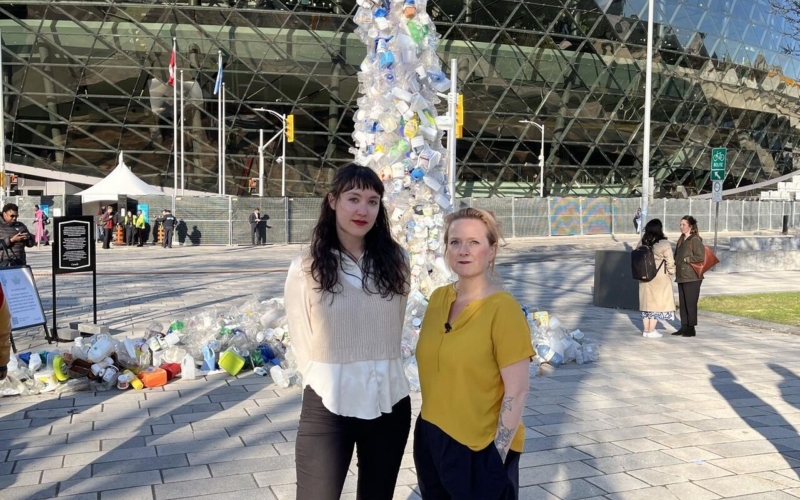
INC-3 in Nairobi 13-18 November, 2023
Especially relevant to the GOMPLAR project is the provision of fishing gear, which has developed exponentially since INC-3.
We look forward to seeing a waste management provision at the finalization of the treaty outcome to ensure ALDFG (Abandoned, Lost or otherwise Discarded Fishing Gear) is safely returned to shore.
Arctic Frontiers, Tromsø 29 January – 1 February, 2024
Ina Helene Ahlquist, SINTEF Ocean, gave a presentation “Adaptive ecosystem management in the Arctic: seriously, plastic pollution is not a game but, in this study, we play as if it were”.
The background is that the choices we make, and the perceptions we have, are influenced by our experiences and knowledge. To make choices that prevent and manage marine plastic pollution, we need knowledge about how human activities and life in the ocean are interrelated.
“Serious games” is a method to increase ocean literacy through:
- Train the participants on relations between people and the ocean, including the consequences of plastic pollution, through discussions.
- Transform a complex problem more tangible by turning it into a game.
- Get insight into the participants existing knowledge about the problem. We must know the status quo to make adaptations.
“Serious games” is also referred to under this newsletter’s paragraph on Arctic Circle 2023.
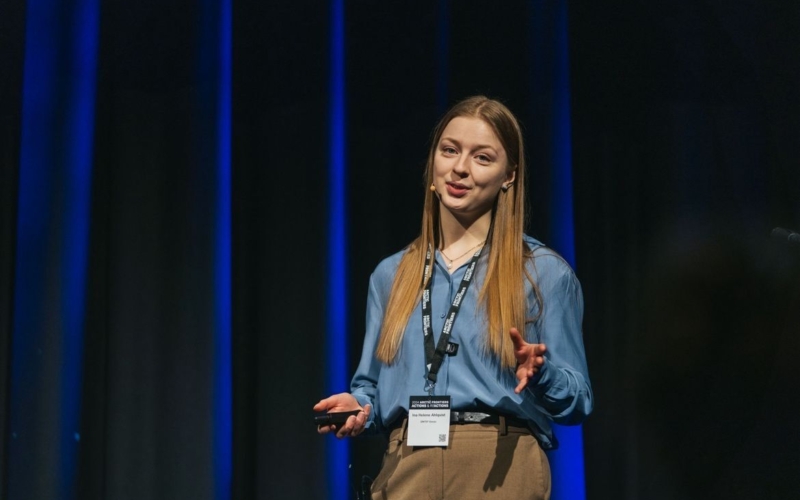
Arctic Plastics Reykjavik 22-23 November, 2023
GOMPLAR had two presentations at the Second International Symposium on Plastics in the Arctic and Sub-Arctic Region, in Reykjavík, in addition to posters.
- Anne Gaspers (SINTEF Ocean) and Anne Katrine Normann (Centre for the Ocean and the Arctic at UiT The Arctic University of Norway): “Blurred interface: How lack of coordination between governance levels obstructs waste management in fishing harbors. The case of Tromsø”, Theme 5 on Arctic challenges and solutions for improved waste management.
- Emily Cowan: “The Influence of Arctic States within the ongoing global plastic treaty negotiations”, Theme 6 on Tackling plastic pollution: International collaboration, politics, best practices and novel developments from around the world.
- Leilei Zou and Jie Lu (Shanghai Ocean University): Poster on “Arctic Marine Microplastics Management”.
- [In addition, Jeehye Kim (KMI – Korea Maritime Institute) with Yoonjung Lee and Sujin Park, were scheduled to give a talk on “Challenges in addressing ALDFG: A focus on Korea’s adoption of a deposit refund system for fishing gear”. Regrettably, they had to cancel due to illness].
Anne Katrine was the moderator of Theme 1: “Monitoring and assessment of plastic pollution in the Arctic”, including for the panel discussions, where Emily was one of the panel members. Furthermore, Anne Katrine was part of the science advisory committee planning the Arctic Plastics conference.
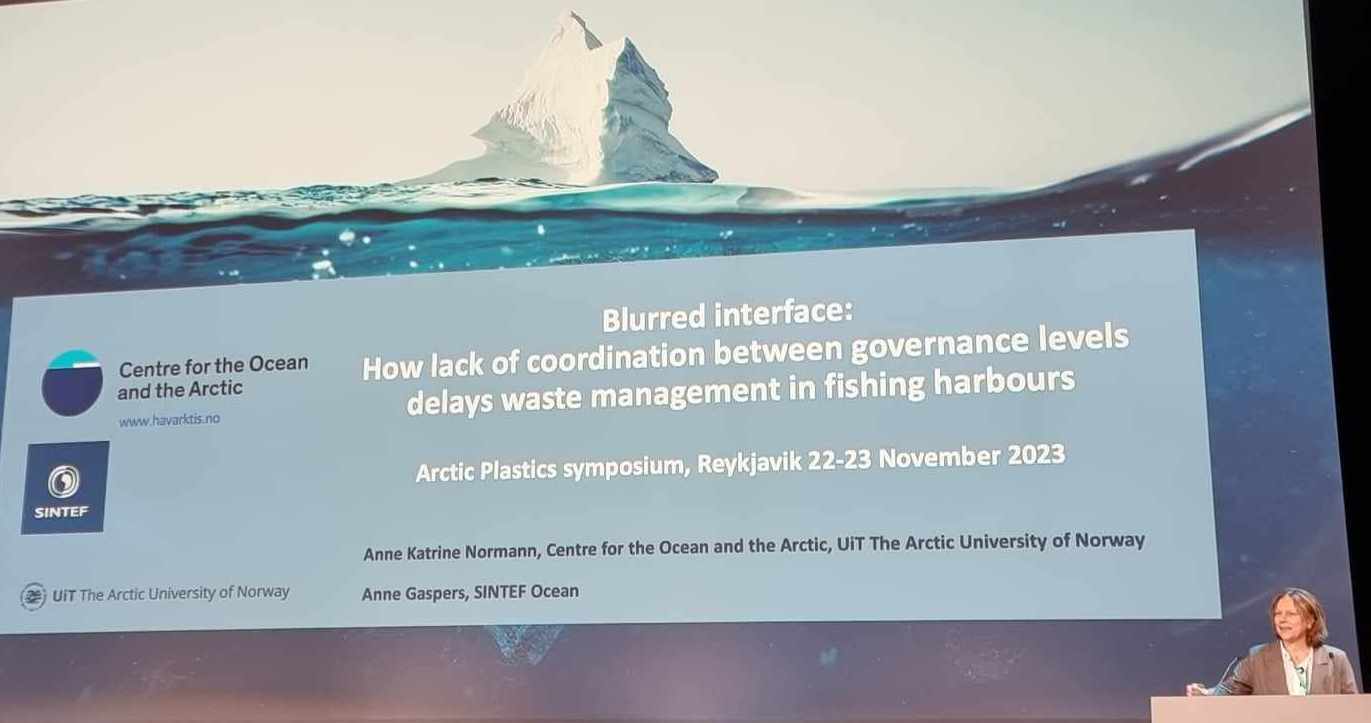
WP5 case on Circular Economy – Roundtable in Tromsø 13 November, 2023
Mandatory and tailor-made waste management solutions in fishing harbors are regulated by law and a necessary contribution to end plastic pollution.
In GOMPLAR WP5 case study «To safe harbor», Centre for the Ocean and the Arctic at UiT The Arctic University of Norway collaborates with Tromsø-based waste management company Remiks and consultancy North Agency, as well as small fishing harbor operators to establish harmonized waste management solution.
Several actors were gathered for the roundtable discussion, organized by Silje Elde and Anne Katrine Normann of the Centre for the Ocean and the Arctic at UiT The Arctic University of Norway, with Remiks and North Agency. Participants included Tromsø and Karlsøy municipality representatives, fishing harbor responsibles, the County Governor of Troms and Finnmark, The Norwegian Fishermen’s Association, and The Fishermen’s Sales Organization (Norges Råfisklag).
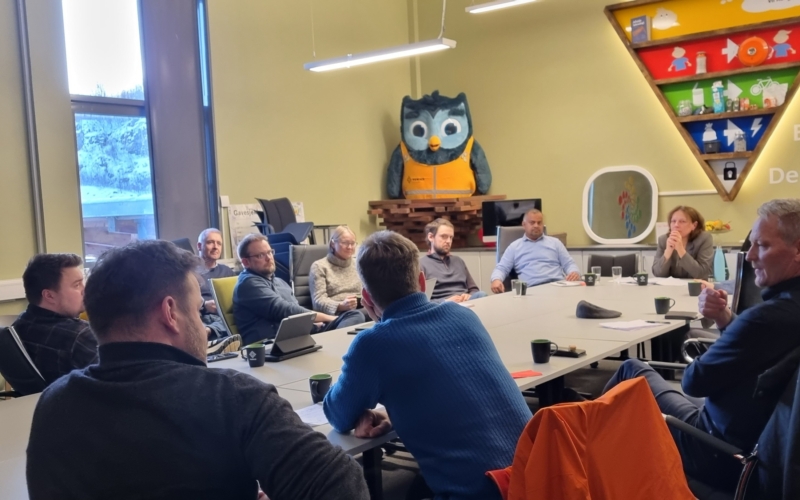
Arctic Circle, Reykjavik, 19-21 October, 2023
GOMPLAR was represented by SINTEF Ocean and Centre for the Ocean and the Arctic at UiT The Arctic University of Norway.
Else Welde of the Centre for the Ocean and the Arctic at UiT The Arctic University of Norway gave the presention “Safely ashore. Step-by-step towards a circular economy”, with preliminary results from the WP5 Tromsø case “To safe harbor”, which works to enhance plastic waste management systems in the small fishing harbors in Tromsø.
The Serious Games: SINTEF Ocean organized a gaming session Saturday 21 October at the Arctic Circle 2023, where all conference participants were welcome to play. There were 67 participants distributed on 15 tables, including researchers, managers, students, and industry.
The game was exhibited by SINTEF during the whole conference, informing about the game, and the projects GOMPLAR, and PLASTICENE.
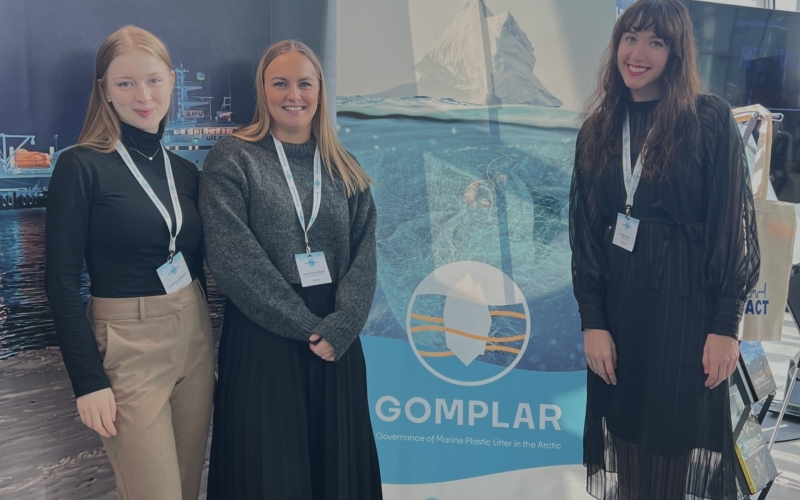
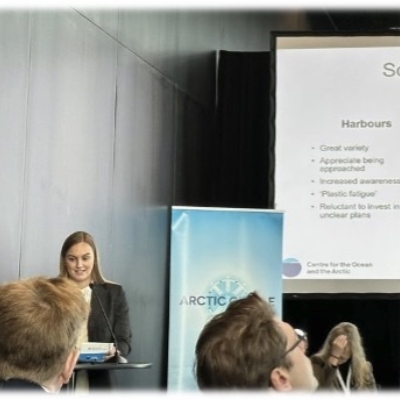
Work in progress
WP1 Northeast Atlantic: Alexei Bambulyak (Akvaplan-niva), Helge Flick and Piotr Graczyk (NORCE), and Anne Katrine Normann (Centre for the Ocean and the Arctic at UiT The Arctic University of Norway) are working on a manuscript with the preliminary title: “How can marine plastic pollution governance in the Arctic implement lessons from the Northeast Atlantic? Marine plastic pollution – from the Arctic to the global and back”.
WP2 Northwest Pacific: Leilei Zou (Shanghai Ocean University), Jeehye Kim (Korea Maritime Institute), Helge Flick (NORCE) and Anne Katrine Normann (Centre for the Ocean and the Arctic at UiT The Arctic University of Norway) are preparing project manuscripts and a WP2 digital workshop.
Publications
- Rachel Tiller (SINTEF Ocean) is a Senior Editor of the new journal Cambridge Prisms: Plastics, publised by Cambridge University Press. Together with other Senior Editors, she has published an opinion piece about the journal entitled “Introducing Cambridge Prisms: Plastics”
DOI: https://10.1017/plc.2023.14 - Article manuscript under review: Anne Katrine Normann (UiT The Arctic University of Norway) and Anne Gaspers and Emily Cowan (SINTEF Ocean): “Blurred responsibilities: Inconsistent coordination between governance levels obstructs well-functioning waste management in Norwegian fishing harbors. Waste management plans for fishing harbors – a stumbling block or a way forward?" Based on interviews, observations, and document reviews regarding waste management facilities in small fishing harbors in neighbor municipalities Tromsø and Karlsøy, within the context of the international negotiations for a plastic agreement.
- Elizabeth Mendenhall (The University of Rhode Island): Making the most of what we already have: Activating UNCLOS to combat marine plastic pollution. Marine Policy 155 (2023) 115635.
- Emily Cowan, Rachel Tiller, Thea Lurås Oftebro, Mimmi Throne-Holst, Anne Katrine Normann: Orchestration within plastics governance – From global to Arctic. Marine Pollution Bulletin 197 (2023) 115635
- Emily Cowan: Event Ethnography to study the global negotiations on the treaty to end plastics pollution: dataset from the first session of negotiations (INC-1). Journal of Environmental Studies and Sciences. Published online 04 April 2024.
- Emily Cowan, Karl Holmberg, Emmy Nøklebye, Idun Rognerud, Rachel Tiller: It takes two to tango: the second session of negotiations (INC-2) for a global treaty to end plastic pollution. Journal of Environmental Studies and Sciences. Published online 20 March 2024.
- While not a GOMPLAR publication, the following article is interesting and relevant, and Emily is a co-author: Thomas Maes, Nicole Wienrich, Laura Weiand, Emily Cowan. A little less conversation: How existing governance can strengthen the future global plastics treaty. Cambridge Prisms: Plastics, 1, e22, 1-12. Published online 06 November 2023.
- Emily Cowan has yet another publication that was accepted June 11th, 2024: The Rule of Three: The Third session of negotiations (INC-3) on the global treaty to end plastic pollution. Journal of Environmental Studies and Sciences.
- Rachel Tiller, Emily Cowan and Ina Helene Ahlquist have submitted a manuscript on INC-4 as well, to Journal of Environmental Studies and Sciences entitled “Standoff at the four-way stop sign: Late night diplomacy at the fourth session of negotiations (INC-4) on the global treaty to end plastic pollution”.
- Rachel Tiller, Emily Cowan, Thomas Maes and Andy Booth have submitted a book chapter on plastic governance entitled “There was no happily ever after…There was only ever after” – Finding a governance solution to the ubiquitous nature of Microplastic pollution” to the De Gruyter Handbook of Ocean Governance and Maritime Affairs, to be published in 2024.
- And impressively: Emily Cowan submitted her PhD thesis in January 2024. Title: Orchestrating a Global Plastics Agreement. Understanding the Actors in the Negotiating Arena with an Arctic Case Study on the Road to End Plastic Pollution. A review committee was announced in June 2024.
Wishing you all a great summer!
Anne Katrine Normann
Project leader, Centre for the Ocean and the Arctic at UiT The Arctic University of Norway

